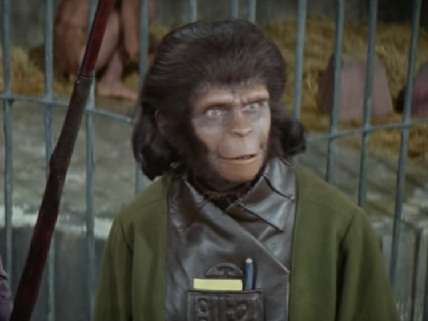I'm a Professor Who Doesn't Use Trigger Warnings. Here's Why.
I don't want to tell students how to interpret a text before they have even read it.


On the first day of class, I tell my students that when we're discussing literature, they should never take my word for it. I'm not going to stand at the board listing facts for them to copy and regurgitate on a midterm—I'm not Cliff's Notes. I want them to read, think, and bring their own understanding of the text to class discussions. If we disagree about the meaning or purpose of something we read and want to persuade people that ours is a valid interpretation, the only evidence that matters is the work itself.
My degrees and academic title are not bludgeons of truth. Yes, I've spent a lot more time doing this than my students have. I've read the work before, thought about it for longer. I will be able to point to details and angles they might not have considered, but they should never accept my interpretation because I said so.
I believe this egalitarian or nonauthoritarian view of literature, which recognizes only the text as authority—an authority that all readers can access—and treats students like full adults intellectually, is incompatible with the recent trend of providing specific trigger or content warnings before students read potentially offensive material.
The benefits of letting students experience literature for themselves in this way were demonstrated during a recent class discussion. My students had read Planet of the Apes (also known as Monkey Planet), the 1963 novel by French author Pierre Boulle that inspired the movies. A suspenseful satire, it's an easy, fun read despite some disturbing content. The only introductory note I provided to my students was that they might look for connections between the book and Part IV of Gulliver's Travels, which we read the week before. I conducted class as I often do, asking students to point out scenes, sentences, or details they wanted to discuss and letting the conversation go where it may. A student volunteered. She had found the behavior of the book's protagonist-narrator, Ulysse, toward the female love interest, Nova, to be "very disturbing." She directed us to this scene:
"I had had to resort to force to keep her quiet. After receiving a few thundering slaps across her beautiful face, she had eventually calmed down. I had allowed myself to indulge in this brutal behavior almost without thinking; afterward I felt sorry, but she appeared not to hold it against me."
My student quoted not only the slapping, but also Ulysse's "sometimes […] unreasoning desire to terrify Nova by brandishing the flashlight," which he recognizes as cruel but does anyway. He even mentions that the recently acquired flashlight has made him "the absolute master at home" in the cage they share. These details support the student's view that Ulysse's behavior towards Nova is domestic violence.
I didn't ask whether my student should have found the scene disturbing. Should has nothing to do with it. She found it disturbing. I accepted that. My student had read carefully, reached her own conclusion, and could support that conclusion by pointing to examples in the text. Other students had not reacted the same way, but to the degree that the text is consistent with her interpretation, that doesn't matter. I see this as empowering for the student. She knew that she alone had seen this in the reading and brought it to the class for discussion.
If I'd provided a warning that the text contained domestic violence, lots of students would have seen it only because I told them it was there. My authority would have been imposed on not only the discussion, but the initial reading. Instead, a peer had presented the idea to them. The student who had read carefully, and found something that struck her as important, might have been denied the opportunity to experience the book for herself and share it with others if I told her and everyone else what to think before they read.
Another reason I avoid content warnings—as our class discussion subsequently explored—is it's not entirely clear that "domestic violence," as we understand that term, quite fits the context of the story. In the novel, unlike the movie, the humans are completely naked. They are not merely a primitive tribe, but live like animals at the civilizational and intellectual level of apes. Nova bares her teeth at the books Ulysse is reading with his flashlight, before he shines it on her. That she is frightened of a flashlight and books is only one of many indications in the novel that humans are little more than beasts, like Gulliver's unreasoning Yahoos. Nova is consistently described in terms appropriate for a wild animal (while also being described as a "marvelous beauty"). She is not portrayed as a frail victim. In one scene, she strangles an innocent chimpanzee to death with her bare hands; in another, she climbs a tree like an ape.
The slapping scene might be considered in the context of the story of a man who travels to a faraway planet and discovers it's ruled by apes. After Ulysse convinces the chimpanzee-scientist Zira that he is not a wild animal like all the other humans on the planet, Nova acts aggressively, screaming and throwing straw in Zira's face whenever she approaches, jeopardizing Ulysse's chances of being released from an animal's cage. Readers can decide for themselves if this justifies violence. In any case, the humans on the planet are not considered people. They are hunted like game and experimented on like apes. This is not to say that we cannot see the scene as a kind of domestic violence and disturbing. (When a man slaps a woman to calm her "hysteria" in a book or movie, we might acknowledge that trope's long history, which our class discussion did, pointing to its mockery in the movie Airplane!)
I happen to find the entire relationship between Ulysse and Nova to be disturbing. For a time, his disdain for humans faintly echoes Gulliver's disdain for Yahoos, but she is not remotely odious like they are. Nova is a beast, but he is attracted to her incomparable beauty. He feels affection for her and superiority over her, is kind to her and cruel. In a moment he recognizes as absurd, he is pressured into having intercourse with her while apes stand around, watching closely and taking notes and chuckling (first he performs a love display, dancing like a bird around his mate).
We might want to leave room for students to reach their own conclusions about the nature of this relationship in such a bizarre world. If I had labeled the novel with a content warning for domestic violence, maybe I would have closed the door to that room before anyone had taken a good look inside. As a teacher encouraging students to read and think for themselves, I'm obligated not to. I'm also obligated to foster a welcoming environment in my courses that's conducive to learning and the exchange of ideas.
On the first day of class, along with telling students they should never take my word for it, I let them know what they can expect in my course—what we'll be reading, the approach I take to the material, and what I expect from them. I talk generally about the works we'll be covering, such as broad themes the texts might share. I make some of the same points that I make in this essay about why I won't be telling them many details about the works before we read. (In the future, I can just have them read this essay, unless the class is scheduled to look at Planet of the Apes.)
I probably tell them we'll be reading some disturbing material, but that's true for almost all literature worth discussing. Students who have particular concerns about course content are always free to research the readings or talk to me to help decide if my course is right for them. It's my experience that most of today's students are not nearly as fragile or hypersensitive as the debate over content warnings might imply, and very few of them would bother pausing the bloody mayhem and disturbing sex they're viewing in Game of Thrones to research whether or not an assigned literary work in a course is offensive. Still, they have that option.
Most importantly, in all of our interactions and class discussions, I strive for an openness to different perspectives that I believe makes students comfortable talking honestly about whatever material we're studying, including what they find disturbing or see differently from other members of the class. This method has worked pretty well in my 16 years of teaching thousands of students.


Show Comments (68)